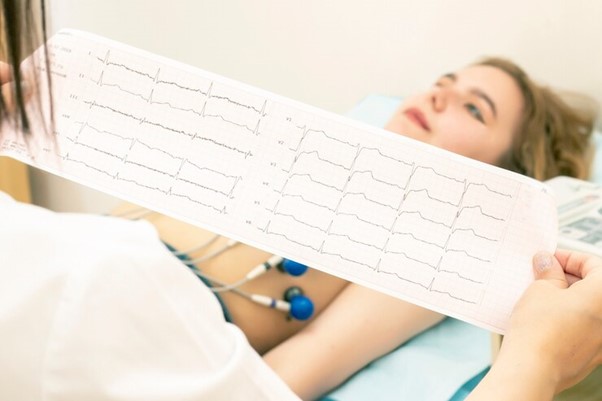Protect Your Heart with the Veda Health Ecosystem
What Is Ventricular Tachycardia (VT)?
Ventricular Tachycardia is an abnormally fast and irregular heartbeat that originates in the
heart’s lower chambers (the ventricles). When the heart races uncontrollably, it fails to
pump blood efficiently, starving the brain and body of oxygen.
If left untreated, VT can escalate into Ventricular Fibrillation (VF), an even more chaotic
rhythm that leads to sudden cardiac arrest — often within seconds.
Types of Ventricular Tachycardia
VT isn’t one-size-fits-all. It varies by pattern and severity:
Monomorphic VT
- Regular and uniform heartbeat
- Typically due to scarred or damaged heart tissue
- Easier to predict and treat
Polymorphic VT - Irregular and chaotic heartbeat
- Often triggered by acute ischemia, electrolyte imbalance, or genetic issues
- Carries a higher risk of deteriorating into VF
What Causes VT?
VT is a red flag for underlying cardiac instability. Common causes include: - Structural Heart Disease – Cardiomyopathy, coronary artery disease, valve disorders
- Myocardial Infarction – Scar tissue after a heart attack
- Congenital Heart Defects – Electrical anomalies present from birth
- Electrolyte Imbalances – Especially potassium, sodium, and calcium
- Drug & Alcohol Abuse – Triggers arrhythmogenic conditions
- Medications – Some antiarrhythmics and psychiatric drugs can induce VT
Symptoms to Watch For
VT can be silent or dramatic. Recognize the signs: - Rapid heartbeats or palpitations
- Chest pain or pressure
- Shortness of breath
- Dizziness, fainting, or near-collapse
Note: VT may present without any warning symptoms. That’s why preventive cardiac
screening is critical.
How Is VT Diagnosed?
At Veda Health, we use a multi-layered diagnostic approach that combines cutting-edge
tests to map your cardiac structure, rhythm, and biochemical status:
✅ Our Healthy Heart Scan includes:
- 12-Lead ECG
- Long Rhythm Holter ECG
- Stress ECG
- Heart Rate Variability (HRV) Testing
- CT Coronary Calcium Score
- Serum Homocysteine & Lipid Profile
This integrated view helps detect silent abnormalities and predict arrhythmic risks —
before they escalate into emergencies.
How Is VT Treated?
Treatment depends on the severity and cause: - Stable VT: Antiarrhythmic drugs like amiodarone
- Unstable VT: Immediate electrical cardioversion
- Sudden cardiac arrest: Requires emergency defibrillation
For long-term risk prevention: - Implantable Cardioverter Defibrillators (ICDs)
- Catheter ablation procedures
- Lifestyle optimization
How Veda Health Empowers You
Our philosophy is simple:
“ You can’t prevent what you don’t measure.”
The Veda Health Ecosystem is built to protect your life through precision diagnostics. Our
Healthy Heart Scan is not just a test — it’s an insurance policy against the unknown.
We go beyond the stethoscope. We map: - Your electrical cardiac rhythms
- Your autonomic stress response (HRV)
- Your coronary artery calcification levels
- Your inflammatory markers and lipid risk
This is true preventive cardiology, personalized to your biology.
Monitor Yourself Daily: Meet Frontier X2
Pair your diagnosis with real-time heart monitoring using Frontier X2. This wearable
tracks: - ECG during daily activities
- Respiratory rate
- Heart strain and exertion
- Early signs of VT or arrhythmia
This is your everyday safety net, giving you live updates on your heart’s behavior — even
before symptoms arise.
Frequently Asked Questions
What is supraventricular tachycardia (SVT)?
A fast heartbeat originating from the heart’s upper chambers (atria). Generally less
dangerous than VT but still requires evaluation.
What is the first-line treatment for VT?
Depends on stability: - Stable: Medications
- Unstable: Cardioversion
- Emergency: Defibrillation
What triggers VT?
Common causes include heart disease, electrolyte imbalances, medications, and post-heart
attack scarring.
What is the most common cause of VT?
Structural heart disease, especially after a heart attack or in patients with cardiomyopathy.
Final Word: Prevention is the New Cure
Sudden cardiac arrest rarely gives second chances. Don’t wait for symptoms.
Don’t rely on outward fitness. Even athletes and yogis can fall victim.
Book your Healthy Heart Scan today and secure peace of mind for tomorrow.
https://www.vedahealthscan.co

